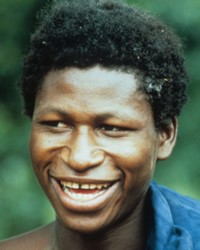Karaboro, Eastern in Burkina Faso

Photo Source:
Anonymous
|
Send Joshua Project a map of this people group.
|
| People Name: | Karaboro, Eastern |
| Country: | Burkina Faso |
| 10/40 Window: | Yes |
| Population: | 81,000 |
| World Population: | 92,000 |
| Primary Language: | Karaboro, Eastern |
| Primary Religion: | Ethnic Religions |
| Christian Adherents: | 10.00 % |
| Evangelicals: | 2.90 % |
| Scripture: | New Testament |
| Ministry Resources: | Yes |
| Jesus Film: | No |
| Audio Recordings: | Yes |
| People Cluster: | Gur |
| Affinity Bloc: | Sub-Saharan Peoples |
| Progress Level: |
|
Introduction / History
The various Senufo groups live in the Middle Volta region of West Africa, which includes parts of Côte d'Ivoire, Mali and Burkina Faso. They are divided into three groups: Northern, Central, and Southern according to the three distinct language divisions. The Northern Senufo are a cultural mixture of immigrants from around Odienne and Fourou, who intermarried with groups in the Kenedougou region. Among the Senufo tribes are over thirty dialects, one called Eastern Karaboro.
What Are Their Lives Like?
Most Eastern Karaboro are subsistence farmers. They cultivate dry rice, yams, peanuts, and millet in the grasslands that are prevalent in their region. One of the most important ways for a male to gain prestige is to become a “sambali,” which is a "champion cultivator." A “sambali” is respected throughout his lifetime and upholds the honor of his residential settlement before the entire village and surrounding district.
One important aspect of Senufo society is its concept of "community." The Senufo think of themselves as one group, with all of their ideas pointing in the same direction. The concept of individuality is known only in limited circumstances; therefore, no man stands alone. Instead, each person is considered part of an extended family, a member of the village, or an elder or a younger sibling within the community. Everyone in a family eats as a group and dips into a common dish. The community collectively works the fields, stores food together, and each family contributes to the village. Eastern Karaboro individuals are always aware of their place in society and how it relates to others in the group. To them, the good of the community always comes before the good of the individual. Unless the entire tribe makes a change, such as converting to a different religion, no one does.
Today, young Eastern Karaboro men have opportunities to move to the cities and earn money. This has weakened the influence that Senufo fathers formerly had over their sons. The importance of the communal nature of their society has also declined. Unfortunately, the weakening of these two areas has allowed Islam to spread into the cracks of this rapidly changing society.
What Are Their Beliefs?
About one-fourth of the Senufo are Muslim, although that figure is steadily increasing. The remainder continue to practice their traditional African religions. They believe in various gods and ancestral spirits and practice witchcraft, magic, and cults as part of their daily routines.
What Are Their Needs?
Two varieties of Karaboro have been documented: Kar and Syer. To date, only limited material is available on Syer. As their society is rapidly changing, they have an urgent need for more resources in their dialect giving them opportunities to respond to the gospel before a total conversion to Islam takes place.
Prayer Points
Pray for the Lord to open doors for Christians to help the Eastern Karaboro people gain access to the complete Bible.
Pray for the Holy Spirit to grant the Eastern Karaboro people hearts that are teachable and open to understanding.
Ask the Lord to raise up people willing to go to West Africa to share Christ with the Eastern Karaboro and give the believers among them the courage to proclaim the gospel to their own people.